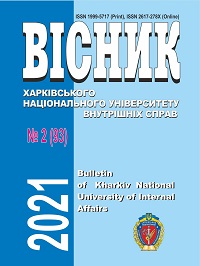Perspectives of Legal Policy on Balancing the Discretionary Provisions of the Tax Code of Ukraine
Abstract
The purpose of the article is to reveal the key tendencies of legal policy to balance some discretionary provisions of the Tax Code of Ukraine. The author of the article has primarily used the formal and legal special research method. The emphasis has been placed on the fact that the legal institution of discretion in applying the norms of financial law is a complex legal category, which covers the procedural discretion of the subjects of authoritative powers under the norms of substantive (financial) law, as well as administrative and procedural discretion (judicial discretion of administrative justice ).
The directions for improving the tax legislation have been outlined. It has been offered to recognize that the acts of local self-government agencies are not regulatory within the meaning of the Law of Ukraine “On Principles of State Regulatory Policy in the Sphere of Economic Activity” and Part 12 of the Art. 59 of the Law of Ukraine “On Local Self-Government in Ukraine” and requirements of the Law of Ukraine “On Principles of State Regulatory Policy in the Sphere of Economic Activity” are not applied to them. The author has stated the expediency of transferring procedural norms from the tax legislation to the specialized procedural act and has highlighted the ways of its implementation.
The relevance of the research is that the globalization of economic relations at the global level requires the unification of standards of interaction, in particular based on the principle of “predominance of essence over the form” taking into account national characteristics of socio-economic system, related to the interests of real and potential market participants, existing resources and possible economic benefits. It has been concluded that the principle of legal certainty should determine the legal policy on the implementation of the provisions of financial and tax law. Excessive discretion of law-enforcement officials will certainly not promote the rule of law, but one should take into account the current socio-economic situation in the country. While formulating legislative initiatives, it is necessary to primarily rely on the logical laws, general theoretical ideas about the legal system, the rules of legislative technique and economic feasibility.
Downloads
References
Krauthausen R., 1955. Ermessen und unbestimmter Rechtsbegriff. Verwaltungsrecht JZ.
Greer S.C., 2000. The Margin of Appreciation: Interpretation and Discretion Under the European Convention on Human Rights. Human rights files No. 17. Council of Europe Publishing, No. 58, pp. 22-31.
Morse Е.A., 1999. Reflections on the Rule of Law and «Clear Reflection of Income»: What Constrains Discretion? Cornell Journal of Law and Public Policy, Vol. 8, Iss. 3, pp. 445-159.
Cogan D., 2011. Tax, Discretion and the Rule of Law. In: Evans C., Freedman J., Krever R. (eds.). The Delicate Balance: Tax, Discretion and the Rule of Law. Amsterdam: IBFD. Pp. 1-14.
Hart H. and Sacks A., 1958. The Legal Process: Basic Problems in the Making and Application of Law. Tentative Edition. Goleta: Foundation Press.
Dorado A.P., 2011. The Delicate Balance: Revenue Authority Discretions and the Rule of Law – Some Thoughts in a Legal Theory and Comparative Perspective. In: Evans C., Freedman J., Krever R. (eds.). The Delicate Balance: Tax, Discretion and the Rule of Law. Amsterdam: IBFD. Pp. 15-37.
Copyright (c) 2021 A. A. Barikova

This work is licensed under a Creative Commons Attribution 4.0 International License.




